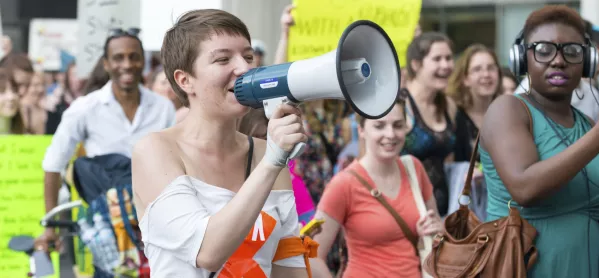- Home
- ‘Young people have become embroiled in our gender war’
‘Young people have become embroiled in our gender war’

It’s an unfortunate reality of politics and media that the loudest voices tend to belong to those with the most extreme opinions (think Trump, Hopkins and Farage, the unholy trinity of poorly researched, bigoted gumpf).
Never is this statement more true than when applied to gender politics. If it isn’t Germaine Greer blathering offensively about the transgender people, it’s Milo Yiannopoulos flinging far Right-wing, misogynistic bile into the cyber sphere. Thus, what was once a noble quest for gender equality has become akin to a Punch and Judy show, characterised by members of opposite clans flinging insults at one another across the no-man’s land of actually making anything approaching sense.
Most of my social acquaintance don’t identify as what I’d term a “hardcore” feminist or feel the need to take issue with the feminist agenda. I’m proud to identify as a feminist, even if I have reached the point where I feel the need to qualify the statement by saying “because for me feminism means all genders having equal rights”.
You’re just as likely to find me talking about how we have to engage men and boys in the mental health discussion in a way they relate to in order to reduce our terrifyingly high male suicide rate as you are the travesty of body image issues meaning 48 per cent of 11-14-year-old girls are avoiding everyday school activities.
Of course, as someone who sits smack bang in the middle of the Big Gender War, I am besieged on both sides by criticism. The No More Page Three Campaign accused me of being “not feminist enough” (because in a world where 97 per cent of 16-year-olds are regularly consuming online pornography, I actually thought page 3 was a useful and relatively harmless way of broaching the topic) and website Return of Kings accused me of being a dangerous and militant man-hater, brainwashing young people and governments alike with my feminist agenda. It took me a while to work out that attempting to engage with either side was a total waste of time and that I should simply continue to push my real agenda, which is fairness for all, without deference to their misguided opinion of me.
It all seemed unimportant in the scheme of things, compared with the experience of working with actual young people in real classrooms. That was until the online gender wars started to interfere with my work in schools.
Several times over the past months and twice during the past week I’ve had teenage boys come up to me after class and tell me they were surprised and impressed by how “reasonable” my views are because they “looked me up online” and “saw I was a feminist”. I’ve had an equal number of teenage girls say, “Can you come back and do a talk about what feminism actually is because we don’t think the boys in our year understand?”
This is a huge problem. With misunderstandings about the nature of feminism, caused by groups on either side of the spectrum propagating myths by either emulating a stereotype or holding these stereotypes up as representative, we’re in danger of rewinding a lot of the progress that’s been made. Furthermore, if prejudices and preconceptions gleaned from the internet are preventing young people from effective communication and interfering with their school lives, it’s time to examine the situation in a structured way, with a positive outcome which will mean more harmony between genders.
That’s why I’m so pleased feminism is to be reinstated in A-level politics, but I don’t think this goes far enough. An open and frank discussion, including all genders, where everyone is allowed to express themselves freely and without judgment, needs to form part of PSHE. And discussion of feminism shouldn’t be confined to women’s historical struggles but to what is happening on social media today to cause such discord and discontent.
The government has made fighting radicalisation a priority under the current guidelines. It is my belief that websites like Return of Kings and their ilk are actually radicalising vulnerable young men into misogynistic thought and behaviours. We cannot address this without first considering the root cause - the Men’s Rights movement online was not created by its most vocal advocates, it existed because a significant swathe of men feel marginalised by their understanding of the feminist agenda. Their feelings shouldn’t be dismissed.
We are creating a generation of young people who see each and every issue through the prism of feminism, whether they are in favour or vigorously opposed. For many, it is their “ground zero” for forming an opinion on anything. It’s our responsibility as their educators to understand where these views are coming from and try to present a more balanced view, based not on personal power struggles and out-of-control egos but on a genuine desire to create a fairer and more inclusive society.
Natasha Devon is the Department for Education’s mental health champion. She tweets at @natashadevonMBE
Want to keep up with the latest education news and opinion? Follow TES on Twitter and like TES on Facebook
Keep reading for just £1 per month
You've reached your limit of free articles this month. Subscribe for £1 per month for three months and get:
- Unlimited access to all Tes magazine content
- Exclusive subscriber-only stories
- Award-winning email newsletters


